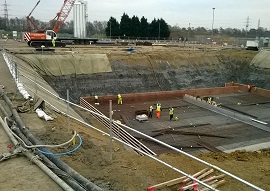Geotechnical engineering
Geotechnical engineering is a practice that relates to the engineering behaviour of the earth and its materials. As a branch of civil engineering it is of great importance to construction activities taking place on the surface or within the ground, as well as to mining, coastal, drilling and other disciplines.
Despite having considerable overlap, geotechnical engineering differs from engineering geology in that it is a speciality of engineering, whereas the latter is a speciality of geology.
Geotechnical engineers are responsible for evaluating subsurface and soil conditions and materials, using the principles of soil and rock mechanics. They are commonly appointed as consultants on construction projects. Engineers also examine environmental issues such as flood plains and water tables. By doing so, they are able to determine whether a particular site is suitable for a proposed project, and can inform the engineering design process with regard to how ground conditions can be made safe and effective for construction.
From geotechnical surveys, engineers will be able to evaluate the stability of the ground, including any slopes and soil deposits, assess any risks and/or contamination, and help to determine the types of foundations and earthworks that will be required. The potential for hazards such as landslides, earthquakes and other seismic activity can also be assessed.
Geotechnical engineers can be involved in ‘ground improvement’, in which soil is treated through a variety of different techniques to improve strength, stiffness, and/or permeability.
Geotechnical engineering is also important in coastal and ocean engineering, in relation to building wharves, jetties, marinas and coastal defences, as well as foundation and anchor systems for offshore structures such as oil rig platforms. Engineers may also work on embankments, tunnels, channels, reservoirs, irrigation systems, and so on.
NB Roles in construction projects: analysis and terminology, by Hughes, W. and Murdoch, J. R, published in 2001 by the University of Reading, defines a geotechnical engineer or geotechnic engineer as a: ‘Consultant with specific responsibility for contributing advice and information on aspects connected with conditions below the surface of the ground.’
[edit] Related articles on Designing Buildings
Featured articles and news
One of the most impressive Victorian architects. Book review.
RTPI leader to become new CIOB Chief Executive Officer
Dr Victoria Hills MRTPI, FICE to take over after Caroline Gumble’s departure.
Social and affordable housing, a long term plan for delivery
The “Delivering a Decade of Renewal for Social and Affordable Housing” strategy sets out future path.
A change to adoptive architecture
Effects of global weather warming on architectural detailing, material choice and human interaction.
The proposed publicly owned and backed subsidiary of Homes England, to facilitate new homes.
How big is the problem and what can we do to mitigate the effects?
Overheating guidance and tools for building designers
A number of cool guides to help with the heat.
The UK's Modern Industrial Strategy: A 10 year plan
Previous consultation criticism, current key elements and general support with some persisting reservations.
Building Safety Regulator reforms
New roles, new staff and a new fast track service pave the way for a single construction regulator.
Architectural Technologist CPDs and Communications
CIAT CPD… and how you can do it!
Cooling centres and cool spaces
Managing extreme heat in cities by directing the public to places for heat stress relief and water sources.
Winter gardens: A brief history and warm variations
Extending the season with glass in different forms and terms.
Restoring Great Yarmouth's Winter Gardens
Transforming one of the least sustainable constructions imaginable.
Construction Skills Mission Board launch sector drive
Newly formed government and industry collaboration set strategy for recruiting an additional 100,000 construction workers a year.
New Architects Code comes into effect in September 2025
ARB Architects Code of Conduct and Practice available with ongoing consultation regarding guidance.
Welsh Skills Body (Medr) launches ambitious plan
The new skills body brings together funding and regulation of tertiary education and research for the devolved nation.
Paul Gandy FCIOB announced as next CIOB President
Former Tilbury Douglas CEO takes helm.
























Comments
Rabio Vegetariano